- Home
- Amie Kaufman
Undying
Undying Read online
ALSO BY AMIE KAUFMAN AND MEAGAN SPOONER
The Starbound Trilogy
These Broken Stars
This Shattered World
Their Fractured Light
ALSO BY AMIE KAUFMAN AND JAY KRISTOFF
The Illuminae Files
Illuminae
Gemina
Obsidio
Published by Allen & Unwin in 2018
Text copyright © LaRoux Industries Pty Ltd and Meagan Spooner, 2018
Cover illustration copyright © Mike Heath, 2018
All rights reserved. No part of this book may be reproduced or transmitted in any form or by any means, electronic or mechanical, including photocopying, recording or by any information storage and retrieval system, without prior permission in writing from the publisher. The Australian Copyright Act 1968 (the Act) allows a maximum of one chapter or ten per cent of this book, whichever is the greater, to be photocopied by any educational institution for its educational purposes provided that the educational institution (or body that administers it) has given a remuneration notice to the Copyright Agency (Australia) under the Act.
Allen & Unwin
83 Alexander Street
Crows Nest NSW 2065
Australia
Phone:(61 2) 8425 0100
Email:[email protected]
Web:www.allenandunwin.com
ISBN 978 1 76029 216 4
eISBN 978 1 76063 737 8
For teaching resources, explore www.allenandunwin.com/resources/for-teachers
Cover and text design by Mary Claire Cruz
Cover adapted by Kirby Armstrong
Cover illustration by Mike Heath
Amie Kaufman author photo by Christopher Tovo
Meagan Spooner author photo by Ellen B. Wright
Set by Midland Typesetters, Australia
www.amiekaufman.com
www.meaganspooner.com
We love to tell stories.
We’re so grateful for those who read them.
So, reader, this book is dedicated to you.
CONTENTS
1 JULES
2 MIA
3 JULES
4 MIA
5 JULES
6 MIA
7 JULES
8 MIA
9 JULES
10 MIA
11 JULES
12 MIA
13 JULES
14 MIA
15 JULES
16 MIA
17 JULES
18 MIA
19 JULES
20 MIA
21 JULES
22 MIA
23 JULES
24 MIA
25 JULES
26 MIA
27 JULES
28 MIA
29 MIA
30 DEX: SIX MONTHS LATER
ACKNOWLEDGMENTS
Dear reader,
You know what we love about sequels? Meeting beloved characters again, exploring new parts of a well-traveled world, learning how all the little clues add up in the end. You know what we don’t love about sequels?
Trying to remember what on Earth (or Gaia!) happened in book one.
So we decided we’d help you out with a lightning-quick recap of Unearthed, because we wrote these books to have fun and to be fun, and wandering around confused for half a novel is no fun at all. (Plus, after the cliffhanger in book one, we figured we owed it to you.)
If you haven’t figured it out yet, here be spoilers for Unearthed …
We meet our main characters on the surface of a planet named Gaia, in a far-distant solar system discovered after receiving instructions for building a portal from a long-dead alien race called the Undying. Earth is in dire need of relief, and after the failure of a massive colonization attempt, scientists believe that the Undying hold the only key to saving our planet from ourselves.
Jules Addison is the privileged son of the Oxford professor who first decoded the aliens’ message and urged the world to take notice. When Dr. Addison changed his mind, however, after discovering evidence that the Undying might not be the harmless benefactors they seemed to be, the world turned on him. Jules has made his way to Gaia in order to find proof that his father is right.
Amelia Radcliffe is a scavenger who grew up taking care of her sister, in direct violation of one-child laws. When her sister gets in over her head with a sketchy nightclub, Mia must raise the money to buy back her contract. So she signs up with a professional lowlife named Mink and is smuggled to Gaia’s surface in order to scavenge as many valuable bits of tech as she can.
A scavenger and an academic. Of course, they end up forced to work together. Despite their drastically different upbringings, they learn to respect one another. And as they navigate a series of deadly traps, leading them to another portal deep in the heart of the Gaian temple, they start to fall for each other.
The portal transports them to the southern pole of Gaia, where they discover a vast ship locked in ice. Military forces from the International Alliance, a global coalition of world governments, have beaten them there and Jules and Mia are in for a shock: The woman who recruited Mia is the same woman who recruited Jules, and she lied to both of them about her identity. Jules’s mission was all a setup to lead Mink and her forces to the prize at the heart of the maze: the Undying ship.
While Mink forces our heroes to activate the ship and send it back to Earth, Mia and Jules try to find a way to stop her for fear that Jules’s father was right all along and the Undying technology is dangerous after all. When they fail, they stay on board as the ship launches, determined to find a way to stop the ship before it reaches Earth.
A series of power surges on the ship bring them running in time to discover a corridor full of portals, all activating so that an Undying invasion force can step through.
Think a Trojan Horse, only instead of a dozen crafty ancient Greeks, it’s full of aliens.
Or is it? Because in the final pages of the book, Jules and Mia get a shock even worse than the realization that the Undying aren’t extinct, and that they’re coming for Earth. They watch as one of the Undying soldiers removes a helmet and reveals a human face.
Dun dun duuuun!
So, without further ado, we bring you to an ancient crystalline spaceship in orbit around Earth. We zoom in on a particular deck, and a specific corridor, and a little dark crawlspace beneath it. We’ll leave you there, and wish you happy reading! Hopefully you have as much fun reading this book as we did writing it.
THE DARKNESS IS CLOSE AND STILL, AND ABSOLUTE. MIA IS NEARBY—I can feel her body heat, a gentle warmth along one side. In the quiet, our ragged breaths are as harsh as a siren’s wail.
And then Mia shatters the thick, eerie silence: “Screw it, I can’t do this in the dark—Jules, turn your watch on, will you?”
Despite the fear coursing through me, I find myself smothering a smile as I fumble at my wrist for the LED. A week hiding aboard an occupied alien spaceship, and she’s the one thing I can count on to feel familiar. Safe. Like home.
Most of our devices are dead, with no access to the sun to recharge, but my wrist unit charges kinetically—something I’m increasingly grateful for each day. The idea of existing this way in utter darkness is too terrifying to contemplate long.
The pale blue light spills out from the watch screen. Mia appears out of the darkness like a ghost, her face framed by her choppy black and pink and blue hair, skin white beneath her freckles. She’s got her multi-tool out, and with a wan little smile at me, she goes back to work, trying to pry the bolts off an access cover to the narrow passageway we’re in. The glint of the crystalline stone lining the shaft plays tricks on my vision, masquerading as glittering eyes in the gloom.
The hinge on th
e cover gives a tiny creak of protest as she finally succeeds. Easing the cover aside and letting it dangle from one hinge, Mia reveals the opportunity we’ve been searching for: a chance to get ahead of the Undying aliens that came pouring through the portals on this ship a week ago.
The passageway we’re using is actually a cavity between the walls of the ship. We found these hidden spaces by crawling up into the ventilation system to hide in those first frenzied minutes after the ship took off, and the Undying emerged from the portals along the long hallway we’d discovered. We wriggled through the vents on knees and elbows—we still do, occasionally—until we found the hatches leading down inside the walls.
Thick metal doors are recessed along the hallways at regular intervals, ready to snap shut and seal off any one section in case of a hull breach. The vents have impressive shutter systems, no doubt designed to lock down automatically at the first sign of a change in air pressure. As Mia said when she discovered the first set of auto-doors, the Undying are seriously spacefaring. They make the ships we used to reach Gaia look like a kid’s toy rocket set.
The Undying wasted no time in grid-searching the ship, hundreds of sets of boots stomping down the hallways, voices echoing over each other so that the individual words were impossible to make out. They know humans launched the ship—all their traps were designed to make sure we did, after all.
What they didn’t know was that there were two of us still on board.
They would have found Hansen’s body in one of the corridors, where we had no choice but to leave him after one of the International Alliance soldiers shot him. Even as they were dragging him away to dispose of him, Mia still had his blood under her fingernails, from where she tried to stanch his wounds.
I wonder what they made of him. Of us, that we killed one another in the middle of an extraordinary discovery like this.
So Mia and I hid first in the vents, and then in the walls when we found them, and now, after a week on the run, we know our territory. We even have a home base of sorts. We call it the Junction—a slightly wider spot where six different walls meet in a star-shaped intersection, and there’s room to sit, wedged in side by side. We have neighbors on just one side there—a pair of Undying who call each other Atlanta and Dex—and if we hold perfectly still and they stand in the right place, we can listen in on their conversations, and catch a glimpse of them through the vent. And when they’re out of their room, on shift, we can talk quietly ourselves without risk of being overheard.
But we’ve been too busy just surviving to do anything—to hunt for answers, to take action. We haven’t been able to figure out how—or why—they’ve managed to look so much like us, only that they’re not us, and the resemblance only goes skin-deep. We haven’t even been able to figure out what they want with Earth, except that they intend to take it from us.
Whatever that means, neither of us particularly likes the sound of it.
All we need is a single chance to contact Earth. We may not know why they’re here, but if we can warn humanity that the massive ship in orbit isn’t empty, as they believe, there’s a chance the cavalry will arrive before the Undying discover we’re here.
Of course, as Mia pointed out, the IA’s equally as likely to simply blow the ship out of the sky. But I prefer to hope for the best. To trust that they wouldn’t destroy their last chance to discover technology that could save Earth from its rapid decline and dwindling resources.
The access panel Mia’s been working on opens up into the corner of a small chamber habitually occupied by a single Undying worker, whose movements we started tracking two days ago. As best we can tell, this Undying drone seems to think it necessary to take at least two breaks an hour. There’s a slacker in every bunch, and we’re counting on ours today. We’ve heard enough one-sided conversations through the wall that we know he’s outfitted with one of the clever little headsets most of the Undying on the ship wear, composed of a small metal piece that folds over one ear and a slim strip of glass that folds out over one eye.
If these headsets are like phones for the Undying, then maybe—just maybe—we can find a way to use one to call home.
Without wasting a moment of this latest break, we climb down into the small room where our target works, crossing our fingers this is one of his longer absences. I catch Mia as she lets herself drop after me, feet-first. She rests in my arms for a moment, almost nose-to-nose with me, and our eyes meet. My heart speeds, even as I try to remind myself this is hardly the time.
She’s kissed me twice since we met.
Once was to get me to follow her through the portal inside the temple. The second time was right before we thought we were going to die.
Since then, we’ve never been apart for more than half an hour. We’ve curled up together to sleep, we’ve wedged ourselves in together to eavesdrop in the narrow passageways, but neither of us has made a move toward another kiss. Me, because I’m too damned awkward to know if it would be welcome outside an emergency—nothing like a survival scenario with someone who’s had to politely turn you down—and her, because … well, if I knew, this would be easier. Maybe it only occurs to her when we’re in a life-and-death situation.
Then again, one could make a convincing argument that death’s pretty close, and every moment we’re aboard this ship is an emergency.
I wonder if I could convince her of that.
I set her down, and she doesn’t linger, crossing over to the door to stand by it and keep watch, ready to give me as much warning as she can. I turn for the workstation, which thankfully didn’t retract into the wall when its operator left—but then my gaze is caught by the window.
For the first time since I left it, I can see Earth.
I can make out the mostly golden-brown shapes of North and South America, wreathed in white wisps of cloud. Somewhere down there is Mia’s little sister, Evie, lost in the huge sprawl of the two continents. Some green still clings to the bulge of the south, but the coastal deserts in the north are slowly creeping in toward each other.
It’s a paler brown than the rusty red of Gaia. In the short time I was there, I grew quickly accustomed to the barren beauty of the alien planet. I thought I’d die there, at the hands of scavvers, or crushed in a temple trap when my wits let me down, or simply when my breather ran out. Or, over those last few days, at the hands of the IA—of Charlotte, or Mink, or whatever our double-crossing puppet master’s really called.
And after that, I thought I’d die sabotaging this ship, or when that failed, when it came through the portal and self-destructed in an attack on Earth. Now we’re stranded. Compared to being stuck on Gaia, we’re so close to home it’s like we’re standing on the front porch. But without a way to get to the surface, we might as well still be on the other side of the galaxy. And expecting, every day, to be caught and most likely killed.
Mehercule, no wonder I’m tired.
My cousin Neal’s down there too, on the green teardrop of England, hidden around the curve of the globe. Maybe my father too, somewhere in the heart of Prague.
A loud, dull thud nearly sends me sprinting back toward the dubious safety of the ventilation shaft. Mia, at my side, retreats several steps. A spattering of scrapes and a second, smaller clang, and I see a glitter of something metallic drift past the window—the sound came from outside the ship, not inside.
At the Junction, we’re too far in the interior of the ship to have heard this—but here, on its outer edge, we can hear the sound of Earth’s satellites colliding with the ship’s hull, bouncing off as a cloud of debris to drift forever into space, or else return home in an arc of fire as falling stars.
Trying to regain my composure, I grab the headset, hook the curve of the metal over my ear, and position the glass lens over my right eye. I can still see the room beyond it, but after an instant, a line of glowing white text appears, projected in front of me and superimposed over the view.
COMMAND/QUERY?
“Is it working?” Mia whisper
s.
“It’s working,” I murmur, trying to keep my voice calm. “And Mia—it’s in English.”
She meets my eyes, strangely overwritten in my vision by the text in the headset. Her gaze is wide, confused, frightened—but I’ve got no way to comfort her, and no answers to provide.
Abruptly, she stiffens, her gaze going past me toward the exit. “Quick, he’s coming back!”
My heart leaps, and I yank the headset off my head. But when I go to replace it on the workstation, I find my fingers refuse to obey me.
“What’re you doing?” Mia hisses.
“We need this.” I’m frozen, all the more so now that I can make out what Mia heard a second before: footsteps approaching down the corridor. “We can’t just leave it.”
“We steal it, they know we exist.” Mia’s fingers curl around my wrist, squeezing, and under her hand my own relaxes.
“Perfututi,” I mumble, and let the thing go.
I’m about to whirl around and race back to the vent in the wall when I see the headset wobble. My stomach seizes. In my haste, I’ve dropped it down on the edge of the workstation. It teeters, and as Mia and I both lunge for it, it slips off the corner of the desk and drops.
The approaching footsteps falter as the sound of shattering glass echoes through the crystal-lined room. Then they break into a run.
FOR A MOMENT JULES AND I CLASH AT THE VENT ENTRANCE, AND it takes me two long, precious heartbeats to realize we’re both trying to get the other to go first into the vent. I abandon my efforts and clamber up him like he’s a tree, then press myself in against the interior wall as tightly as I can so Jules can squeeze in past me.
His long limbs barely fit, and he makes so much noise when he moves that it sounds to my ears like the drummer in a band has taken up residence inside the walls, but so far no one’s noticed us. I lean over after him, with barely enough room to turn and replace the hatch behind us.
I grab for Jules’s ankle and squeeze, warning him not to move. Reminding myself not to hold my breath, I watch while the worker falters halfway to the console, then bends down to retrieve the headset. Heart pounding, ears straining, I wait.

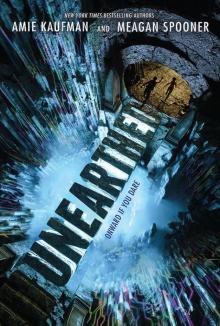 Unearthed
Unearthed Obsidio
Obsidio Gemina
Gemina Aurora Rising (ARC)
Aurora Rising (ARC) Memento
Memento Aurora Burning: The Aurora Cycle 2
Aurora Burning: The Aurora Cycle 2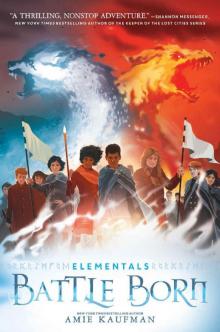 Elementals: Battle Born
Elementals: Battle Born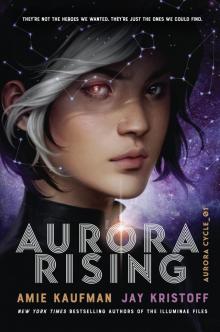 Aurora Rising
Aurora Rising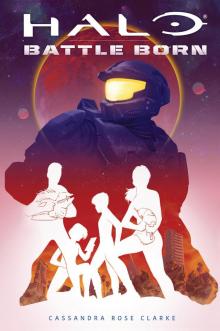 Battle Born
Battle Born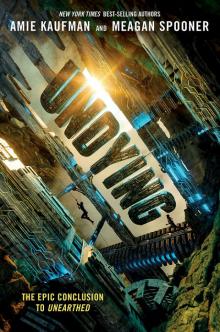 Undying
Undying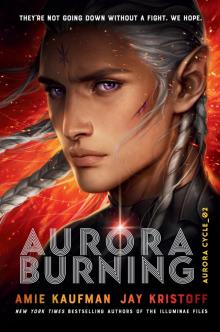 Aurora Burning
Aurora Burning Scorch Dragons
Scorch Dragons Ice Wolves
Ice Wolves Aurora Rising: The Aurora Cycle 1
Aurora Rising: The Aurora Cycle 1 This Shattered World
This Shattered World These Broken Stars
These Broken Stars Their Fractured Light: A Starbound Novel
Their Fractured Light: A Starbound Novel Their Fractured Light
Their Fractured Light Ice Wolves (Elementals, Book 1)
Ice Wolves (Elementals, Book 1)